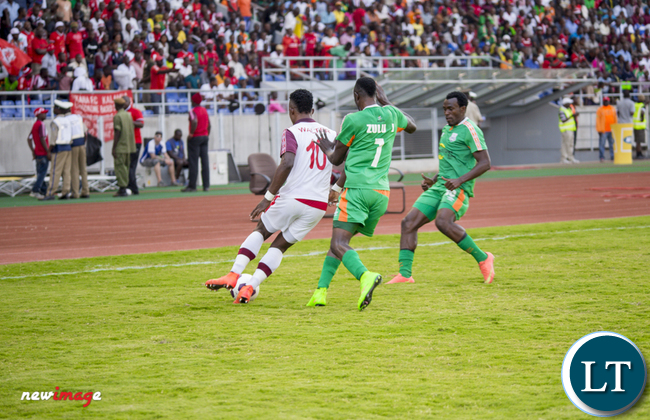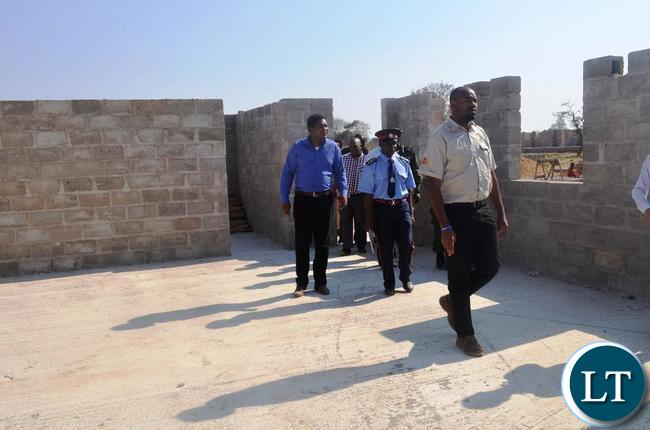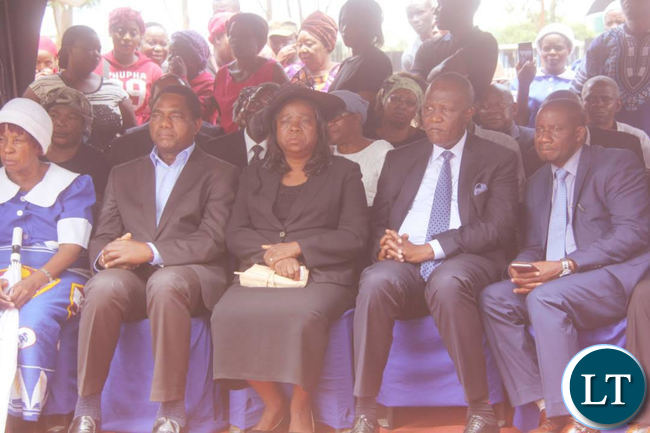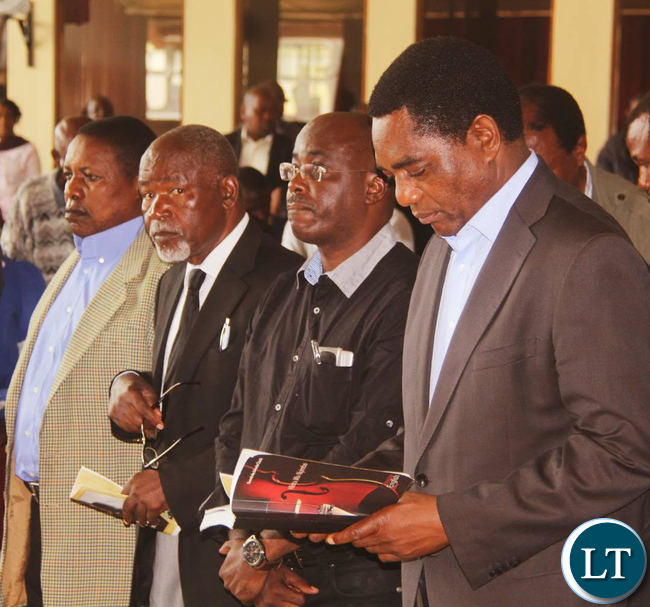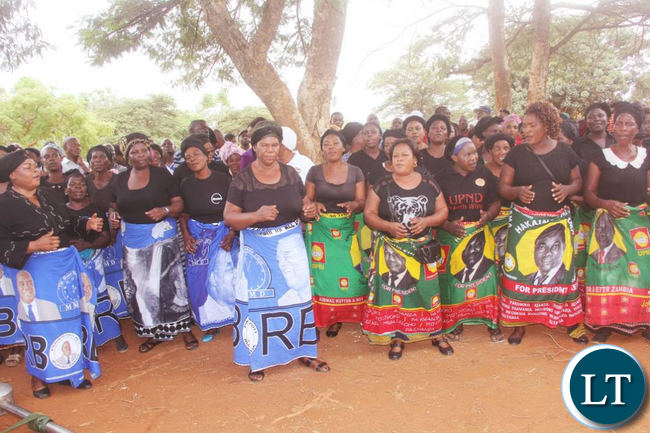Singer, song writer, Rich Bizzy released the video for his single “Ungayende Kumunzi So“. The song features Crew G and was produced by his frequent collaborator Bicko Bicko.
What did Chipolopolo do wrong in the match against Sudan?
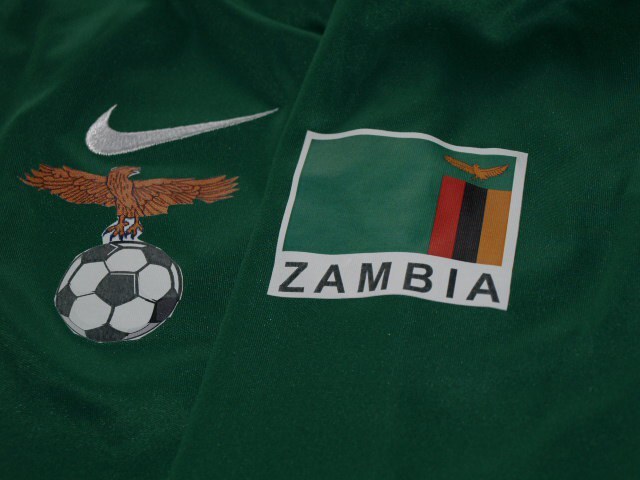
After the recent defeat to Sudan the question arises: what did Chipolopolo do wrong? The situation isn’t new to the Zambian fans, as two years ago the team was bombed out of the tournament at the quarter-final stage. Despite a promising start, they ended up with nothing.
This was a difficult path for Zambians this time. Chipolopolo had to break through a lot of obstacles on the way to the finals without his key players responsible for good performance in the Africa and World Cup qualifiers. Consequently, according to the sports betting website, the match with Sudan ended with 0-1 score.
Zambia chose to use the same old Zonal Marking system against Sudan, as they did in general match progression. It’s obvious, that Chipolopolo didn’t have much alternative. However, the tactics he decided to use was already well-known to their opponents. The players lacked creativity in ball carrying. Sudan was waiting to be pushed back and split. However, Zambians were unable to break through the crowded center of the field and to bury the ball in the net. Sudan’s defense could be broken by increasing the ball circulation speed and forcing the opponent to run around the field into running around. The assists were erratic and exposed the lack of variety in Wada’s tactics.
Right from the kickoff of the match, it became obvious, that the tricks which worked throughout the tournament and helped the squad to get this far, are not working anymore. Considered this, the situation might have turned around in favor of Zambians in the very first half of the match. The team’s obvious inflexibility on the field raises a question of whether Wada Wada is the right man to train the national team.
Despite the bitter the quarter-final loss, Chipolopolo’s players proved to be good enough to take Zambia this far. However, inefficiency of their general strategy as well as tactical mishaps became the main reason for this unfortunate loss. More information on team’s games scores is available at Stakers.com
[Sponsored Article]
ZCEA welcomes sentencing of Njoya T’s wife
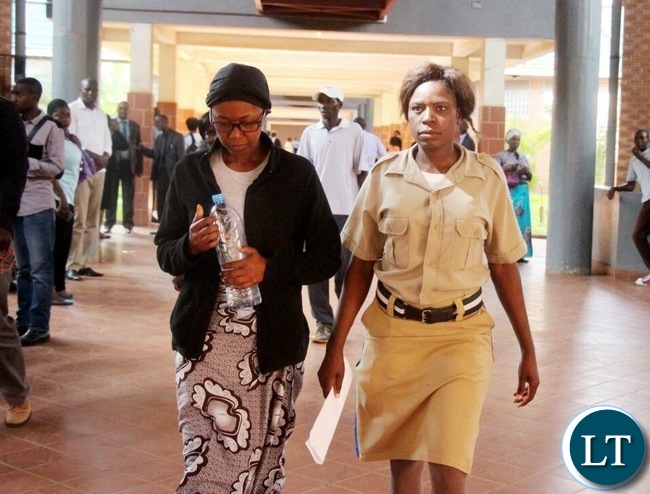
The Zambia Civic Education Association has described the five year jail sentence slapped on Njoya Tee’s wife Brenda as landmark.
In an interview in Lusaka, Association President Judith Mulenga said the sentence will serve as a deterrent to other would be offenders.
Mrs Mulenga said cases of child abuse as a form of punishment are rampant in Zambia and that they often go unreported.
She said the Association is planning to use the judgement as an advocacy tool to sensitise the public on the dangers of abusing children.
Mrs Mulenga said there is need to prohibit corporal punishment at home which has already been prohibited in schools and in other public places.
“This is a lesson to all those taking care of children that these children also have rights and that the law protects them. This is a big land mark case and as you know this assault is in the guise of discipline or corporal punishment.
Since corporal punishment is not prohibited in the home, although prohibited at school and other places, so this judgement is a good precedent so that children are protected from .
“Some argue that it is acceptable to beat children as a form of punishment, the convict here even says i didn’t mean to harm the victim but i say, it is not up to you, it is up to the recipient, you can’t say i am not harming the child, it’s not you but the recipient and the harm done to the child cannot be under estimated.
Mrs Mulenga stated that most African homes can be described as real laboratories of violence against children.
President Edgar Lungu addressing the marketers at Chisamba Market and inspecting Momboshi dam In Chisamba










Walter Bwalya explains omission from Nkana’s Zimbabwe trip
Nkana have travelled to Zimbabwe for pre-season training minus want-away striker Walter Bwalya.
Bwalya is missing from the Nkana delegation that arrived in Zimbabwe on Tuesday ahead of a week-long training camp.
The 2016 FAZ Super Division top scorer recently went AWOL as he tried to join Algeria side MC Alger.
“I just want to rest a bit for now but I will join the team when it comes from Zimbabwe. I am around in Zambia and doing personal training,” Bwalya said on Thursday.
The player, who has publicly spoken about his desire to leave Kalampa, is yet to train with his team mates this year owing to his unfruitful trip to Algeria.
Bwalya made a cameo appearance at the Nkana awards gala night last Saturday to pick the club’s top scorer award hours just after returning to Zambia.
Meanwhile, Nkana are in Zimbabwe getting ready for the 2018 season in which they will compete in the CAF Confederation Cup.
Judiciary Should Earnestly Revisit The Current Case Management Strategy
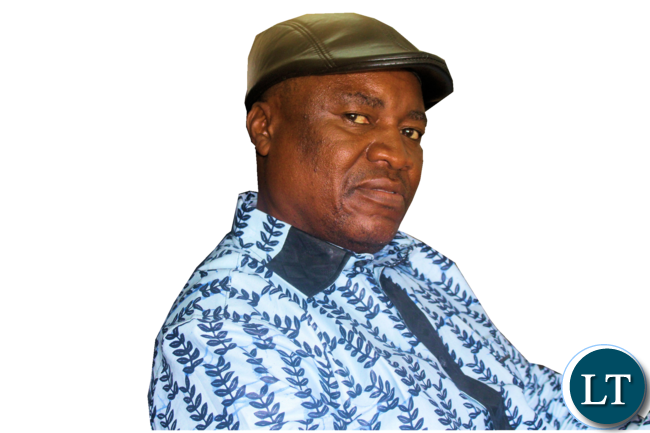
A judiciary that loses public confidence is a more dangerous to national security than is the case with executive and legislature.
As the Green Party, we think that it is not yet too late to reform and win back the public confidence. For this reason, it is imperative that any issues that tend to undermine the dignity of the judiciary are sorted out quickly by all of us, much as we respect and uphold Article 122.
Our considered view is that the tragedy of the judiciary, particularly as regard to superior courts is the case management system. Whilst the Supreme Court, and the Court of Appeal have made impressive strides in case management, there is a very serious problem in the High Court and Constitutional Court.
Much as the Supreme Court and Court of Appeal have made impressive strides in this regard, nonetheless, we still believe more could be done to improve the situation.
The traditional case management system where in essence it is the litigants that control the time, and thereby make cases run forever without finality seriously needs to be dispensed with because it is number one reason for the erosion of public confidence in judiciary.
We suggest that our judiciary takes a leaf and emulates the case management strategy adopted by the Supreme Court of Kenya in the last Presidential election.
Whilst fourteen days appears to be a nightmare here in Zambia, the Supreme Court of Kenya fully complied with the fourteen days prescribed by the Constitution within which to hear and determine a petition.
Like is the case in Zambia, the Kenyan Constitution has set seven days within which any party can challenge the presidential outcome. In Kenya, the Supreme Court registry remained open up until midnight of the seventh day for any party to file a case.
Once the cases were filed, the parties were given by the Court only two days to serve the respondents. The Court ordered that service of the court documents could be done directly or through a newspaper advertisement. The respondents were required to file their replies within four days of being served, and the applicants then had four days to put in additional material to the petition.
A pre-trial conference was held after eight days and the hearing started immediately after the conference. The Court prescribed the number of pages to be submitted and apportioned four days to hear and determine the dispute.
Exactly on the fourteen day, the Court handed down an abridged version of judgment and the full version was ready and distributed twenty one days later thereby fully complying with the prescribed timeframe.
No petitioner cried foul on the timing and court directions.
We suggest that the Constitutional Court and other superior courts should consider adopting the Supreme Court of Kenya case management strategy to avoid the chaos and agony currently existing.
The current system is so frustrating, disgusting and nauseating. It has considerably contributed to litigant’s anguish and frustration thereby leading to growing loss of confidence in the judiciary. It has also contributed to the bombardment of the superior courts, especially the High Court and Constitutional Court, with the Judicial Complaints Commission complaints. This development does not auger well for our justice system.
Peter Sinkamba
President
14 Lundazi schools upgraded into secondary institutions
The Ministry of Education has this year upgraded 14 basic schools into day secondary schools in Lundazi district in an effort to provide quality education nearer to learners.
Lundazi District Education Board Secretary (DEBS) Chiza Mtonga said government’s desire to provide education in all the community has to be achieved by upgrading more primary schools to secondary level.
Mr. Mtonga said it was the Patriotic Front’s (PF) manifesto to upgrade more primary schools to secondary level in the district and to reduce congestion in few township day secondary schools.
He added that the upgrading of schools into day secondary schools was also meant to reduce distances which pupils have to cover to access education at the nearest learning institutions.
On staffing levels in schools, Mr. Mtonga said Lundazi has enough trained teachers to handle the fourteen upgraded secondary schools.
He said currently, township schools are over-staffed hence teachers will be redistributed to rural parts of the district so as to reduce the teacher/pupil ratio and to be promoted.
Mr. Mtonga named some of the upgraded schools as Tigone, Msuzi, Nyangwe, Kapichila, Mphamba and Mkomba in Lundazi Central constituency.
Others are Mwasemphangwe, Chaomba, Luamphamba and Chanyalubwe in Lumezi constituency while in Chasefu constituency, the upgrade schools are Kakoma, Egichiken, Nkhanga and Lupamadzi schools.
He said Lundazi district now has a total of 28 secondary schools, three of which are boarding.
Zambia ranks among the least in transparency on how public money is used
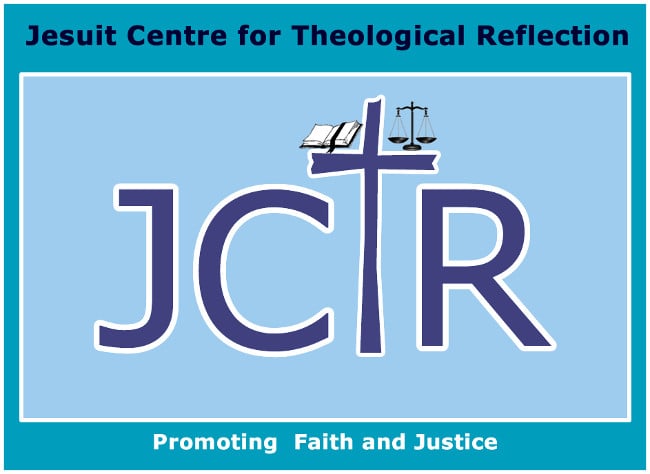 Open Budget Survey 2017 Results Launch – Press Statement
Open Budget Survey 2017 Results Launch – Press Statement
As progress toward global budget transparency stalls for the first time in a decade, Zambia ranks among the least in providing its citizens with information on how public money is used
Amid declining public trust in government and increasing inequality around the world, a major independent global report finds that the government of Zambia could improve transparency quickly, with little cost or effort.
Many governments around the world are making less information available about how they raise and spend public money. Zambia based on information assessed between July 2015 and December 2016 was rated among the least transparent with regard to their national budget, according to the results of the Open Budget Survey 2017 (OBS), conducted by the International Budget Partnership (IBP).
After 10 years of documenting steady progress in increasing the availability of budget information, IBP says the OBS 2017 showed a modest decline in average global budget transparency scores, from 45 in 2015 to 43 in 2017 for the 102 countries that were surveyed in both rounds (scores are out of a possible 100). This is in stark contrast to the average increase of roughly two points documented among comparable countries in each round of the OBS between 2008 and 2015. The reversal of transparency gains is particularly discouraging given that roughly three-quarters of the countries assessed do not publish sufficient budget information (a score of 61 or higher).
Overall, declines in budget transparency were most dramatic in sub-Saharan Africa, where the average budget transparency scores fell by 11 points between 2015 and 2017. Other regions experienced small increases or small declines in their scores, with the exception of Asia, where the average score rose more substantially. A number of countries have experienced significant gains in transparency since they were first included in the survey, including Georgia, Jordan, Mexico and Senegal.
Warren Krafchik, executive director of IBP, said, “The declines in budget transparency are worrisome against a global backdrop of rising inequality, restrictions on media and civic freedom, and a weakening of trust between citizens and their governments.”
Launched in 2006, the OBS is the world’s only independent, comparative assessment of the three pillars of public budget accountability: transparency, oversight and public participation. The sixth round of this biennial assessment, the 2017 survey evaluated 115 countries across six continents, adding 13 new countries to the survey since the last round in 2015.
Zambia has been in the OBS since 2006, and the 2017 survey finds that it is falls below almost all the other countries on the Open Budget Index, or OBI, which uses internationally recognized criteria to give each country a transparency score on a 100-point scale. Zambia’s OBI score of 8 means that citizens have little or no access to the budget information they need to understand the budget and hold the government to account. This matters because budgets are the main tool governments use to set policies for raising and spending public funds, which promote development and meet the needs of the country’s people.
Zambia’s score of 8 on the 2017 OBI score falls substantially lower than its score in 2015 (39). It is observed that the country’s score has in part been affected by the change in the definition of “publicly available” which from OBS 2017 only recognizes those documents that are published online on an official government website as available to the public. Online availability is now considered a basic standard for the publication of government information because it affords the public a reliable and direct link to information at a minimal cost. Zambia thus no longer received credit for the production of the Executive’s Budget Proposal, which was not available in its entirety on the Ministry of Finance’s website as the link available did not function during the research period even though hard copies were available. It was also noted that, the government has been inconsistent regarding documents it makes publicly available in any given year.
During the research period, Zambia decreased the availability of budget information by producing the Year-end reports for internal use only, not producing the Pre-Budget Statement and failing to make available in a timely manner the Mid-year Review Budget documentation. To improve budget transparency, the Zambian government needs to be consistent in making publicly available the eight Key budget documents through their official website. Publication of budget documentation and guidelines on when this should be done, further needs to be backed by legislation such as the Planning and Budgeting Bill which has taken over 4 years to be presented to parliament and is yet to be enacted.
The OBS 2017 also revealed that most countries fail to provide meaningful opportunities for the public to participate in the budget process — both to inform decisions about how government raises and allocates funds and to hold government accountable for implementing those decisions. Not a single country out of the 115 surveyed offered participation opportunities that are considered adequate (a score of 61 or higher). The average global score is just 12 out of 100, with 111 countries having weak scores (lower than 41). Zambia’s score of 15 out of 100 indicates that there are few opportunities provided by the Ministry of Finance (12), Parliament (33) and the Office of the Auditor General (0) for the public to participate in the budget process. Without opportunities for citizens’ active participation — particularly citizens from marginalized or vulnerable groups — budget systems may only serve the interests of powerful elites.
The Government, Parliament and the Office of the Auditor General (OAG) need to ensure that the public is not only aware of the procedures of the national budgeting process, but should also actively seek submissions from the public during the proposal, implementation and oversight stages of the budget process. These three institutions also need to provide feedback and reports on the submissions made to ensure that it is a two way communication. The OAG needs to establish formal mechanisms for the public to assist it in formulating its audit program and to participate in relevant audit investigations (for example, through social audits or value for money surveys). Further these channels of engagement need to be backed by law to ensure consistent provision of spaces for engagement with the public and active participation of citizens
In addition to assessing transparency and participation, the OBS also evaluated the role of formal oversight institutions, such as supreme audit institutions and legislatures. The survey found that only 32 countries’ legislatures (28 percent) have adequate oversight practices, 47 countries (41 percent) have limited oversight practices, and 36 countries (31 percent) have weak oversight practices. In comparison, the OBS finds that in 75 out of 115 countries (65 percent) the basic conditions for OAGs to provide adequate oversight are in place. Well-funded and independent oversight institutions are critical to better budget planning and implementation.
With regard to the strength of Zambia’s formal oversight institutions, the score for the Parliament (legislature) and the Office of the Auditor General was 48 which showed that the two institutions provided limited oversight of the budget. Specific scores for the two institutions showed that the OAG provided adequate budget oversight while Parliament provided weak budget oversight. It is commendable that in the Constitution of Zambia Amendment Act (2016), the law provides the Office of the Auditor General with full discretion to undertake audits it sees fit. It also provides that the appointment of the head of the OAG based on a recommendation of the State Audit Commission and has to be ratified by parliament, which bolsters independence of the institution. Despite this, the recommendations made by this office and the follow up measures that could reduce wastage of public resources tend not to be acted upon. To improve oversight and thus the oversight score, budget policy contained in the Medium Term Expenditure Framework (MTEF) needs to be debated prior to Presentation of the Budget Speech to parliament by the Minister of Finance. Further, the sector legislative committees need examine and publish reports on in-year budget implementation online. The government and legislature also have to ensure that funding to the newly established Independent Fiscal Institution is adequate and not reliant on international donors and publish its reports and analyses online.
The potential threat that Zambia’s lack of strong budget accountability systems and practices poses to our ability to achieve our development goals is of great concern. The government should take the following steps toward rapid improvement
-
Publishing the eight key documentation on the respective official government websites in a timely manner
-
Enacting both the Planning and Budgeting Bill and the Public Finance Management Bill within 2018 which should provide for citizens participation and strengthen budget oversight respectively.
Globally, the news is not all bad this round. There have been several advances toward more open budgets. While the number of publicly available budget documents decreased in this round of the survey compared to 2015, published documents contain slightly more information now than they did in previous years. Though overall global transparency has declined from 2015, the level of transparency in 2017 remains above where it was a decade ago.
“Transparency scores in this round of the survey show that any government, irrespective of region or culture, can become more transparent,” said Krafchik. “The vast majority of countries in the world could quickly improve transparency by making documents they already produce publicly available. Most countries that produce documents that they are not publishing on their official websites already publish other documents online, so they could easily do so for all documents.”
Copperbelt PS calls for Accountability
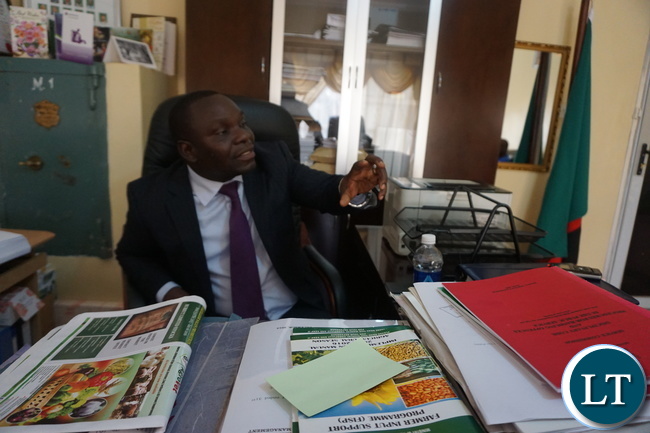
Copperbelt Permanent Secretary (PS) Bright Nundwe has expressed dissatisfaction with the 2017 Auditor General’s report for Copperbelt Province calling for responsible officers to exhibit high standards of accountability and prudent utilisation of funds.
Mr. Nundwe said civil servants are anchors of development and should therefore, embrace accountability, discipline and prudent utilisation of government resources.
Speaking in Luanshya yesterday on a familiarisation visit of the district, the Copperbelt PS called for discipline and respect among public workers and absolute application of professional ethics that promote government policies.
Mr. Nundwe also cautioned civil servants in the district against engaging in political activities and commentaries on social media but concentrate on issues of development to foster a smart civil service.
“I want to warn my fellow civil servants gathered here to stay away from political activities and leave them to politicians, we should all remain loyal to government and support its programmes for the development of the nation” Mr. Nundwe said.
He further implored public service workers to closely monitor all government development projects with keen interest as he did not want to see any stalled projects in the province when government has been releasing funds.
And Luanshya District Commissioner (DC) Joel Chibuye disclosed that China Non-ferrous Metals Company (CNML) Luanshya Copper Mines will reopen Baluba Mine next month following the company’s engagement with President Edgar Lungu.
Mr. Chibuye said the re-opening of the mine will see about 750 mine workers employed with an additional 1644 workers who were sent on forced leave when the mine was placed on care and maintenance recalled.
The Luanshya DC said the contractors engaged to work at Baluba have since completed their recruitment exercise with over 700 people employed.
Catholics condemn St. Charles Lwanga parishioners for protesting at Church
The Copperbelt University Catholic Community has condemned the recent protests by St. Charles Lwanga Parishioners in Lusaka’s Chilenje township.
Speaking in an interview with ZANIS in Kasama, community chairperson Paul Chomba said the church should be respected as a place of worship and not of disputes.
Mr. Chomba described the protests at St. Charles Lwanga as sad adding that parishioners should have resolved the matter amicably through dialoguing with their leaders.
He has since urged Christians to follow proper channels of communication whenever aggrieved.
He added that as Catholics, St. Charles Lwanga parishioners should understand that priests are called to serve anywhere.
Meanwhile, the community has paid tribute to the outgoing Archbishop Telesphore Mpundu for being an exemplary leader in the church.
He has since congratulated the newly appointed Apostolic Administrator for the Archdiocese of Lusaka Alick Banda on his appointment.
Meanwhile, a staunch Catholic Samuel Chanda has described the reaction by the parishioners at St. Charles Lwanga as unchristian.
Mr. Chanda said the parishioners at St. Charles Lwanga politicised the transfer of the two priests.
Recently, congregants at St. Charles Lwanga Regiment Parish in Lusaka’s Chilenje township protested following news to transfer their parish priest and his assistant.
Corruption fight should not be targeted at Political Opponents -RB
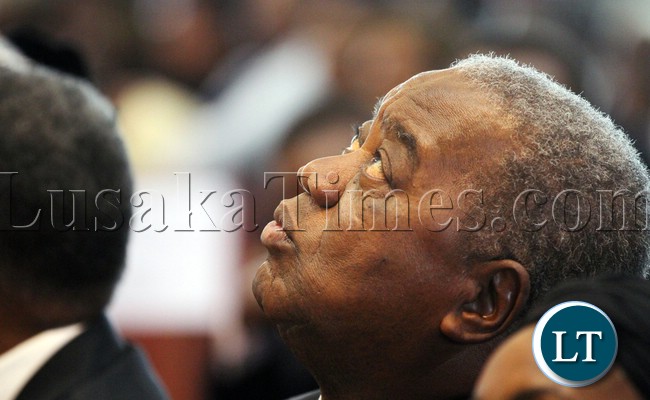
Zambia’s Fourth President Rupiah Banda has called on African Governments to fight corruption saying there cannot be any meaningful development in a country that embraces corruption.
Speaking during a media briefing organized by the Ethiopian Ministry of Foreign Affairs In Addis Abba, Mr Banda, however, cautioned that the fight against corruption should not be targeted at political opponents.
When asked on why some African leaders fail to hand over power freely when they lose elections, Mr. Banda attributed the failure to fear of prosecution after leaving office.
Mr Banda said that there was a bad trend that was emerging in Africa where former Presidents are threatened with prosecution immediately they leave office.
And the Former President has urged African youths to strive at contributing to Africa’s development.
He said it’s unfortunate that many youths are involved in illicit activities and not contributing to the development of their countries.
On the proposed reforms by the African Union, Mr Banda said it was important that reforms that will be introduced will be accepted by all Member States.
He called for more consultation from Member States on proposed reforms that include among others free movement of people and financing the African Union.
Mr. Banda also said Africans must not lose the spirit of panAfricanism .
He said Africa must guard against outside inference in the running of its affairs.
Mr. Banda warned that lack of patriotism can lead to modern colonialisation.
Mr. Banda is in Addis Ababa, Ethiopia to attend a meeting for eminent people who sit on a committee for the Trade and Development Bank.
Meanwhile, Mr Banda has said that Zambia remains one of the few countries in Africa with a shining record of Democracy and peace. Speaking during a media briefing organized by the Ethiopian Ministry of Foreign Affairs In Addis Abba, Mr. Banda said Zambia remains a beacon of peace and that this can be attested by the peaceful transition of governments.
He said the country has never experienced political turmoil when there is a change of government. Mr. Banda said all successive governments have embraced democracy and have allowed opposition political parties to exist freely in the country.
He said Zambians are bound by the slogan One Zambia and One Nation, a slogan he said promotes oneness among Zambians.
Distribution of Energy bulbs saves ZESCO 145 megawatts of power

Zambia Electricity Cooperation Limited (ZESCO) says it has distributed over 3.2 million energy saving bulbs across the Country.
Company Public Relations Officer Henry Kapata said the power utility company has managed to save 145 Megawatts of power due to the distribution of the Energy Saving Bulbs.
Speaking in an interview with ZANIS today, Mr. Kapata disclosed that ZESCO, started distributing energy saving bulbs to kabwe last week and will soon move to Kapiri Mposhi district.
He also mentioned that the power utility company has procured 30 thousand energy savers to be distributed across the country.
Mr. Kapata also stated that ZESCO is procuring 12 million energy saving bulbs of which 4 million have already been received.
Meanwhile Mr. Kapata has attributed the interruption of power supply in areas like kamwala south and libala to ongoing maintenance work.
He said that ZESCO is replacing old cables in kamwala and libala that might allow water to pass through.
Mr. Kapata urged all ZESCO customers to subscribe to ZESCO SMS Service in order for the company to communicate through mobile phones in case of any inconvenience.
HH, Mutati mourn Sikazwe and calls for unity of purpose
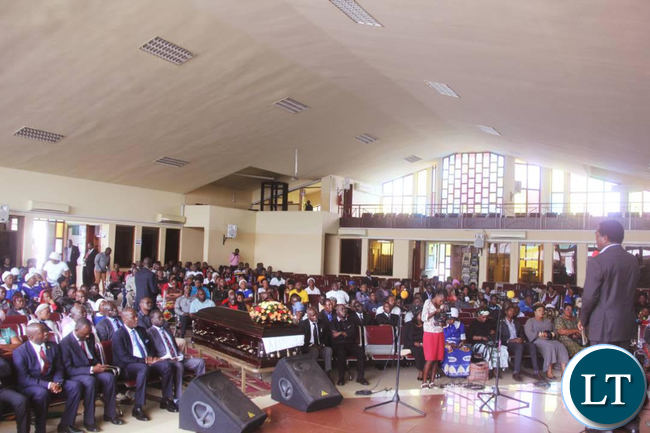
UPND President Hakainde Hichilema has called for unity of purpose in families and in the nation in order to foster peace economic development for all.
Mr Hichilema said this on Thursday morning at the University of Zambia SDA Church in Lusaka during the funeral service for late Chimbamilonga Member of Parliament Brian Sikazwe.
Mr Sikazwe was Chimbamilonga MP from 2006 to 2011 and was the UPND’s 2016 parliamentary candidate.
Mr Hichilema was joined in by Finance Minister Felix Mutati in the send off ceremony for the late Mr Sikazwe.
The UPND leader encouraged fellow mourners to remain hopeful of a greater tomorrow even amidst social and economic challenges.
And Mr. Mutati also echoed Mr Hichilema’s sentiments that there is need for Zambians to put oheads together when the country’s economy is on its knees.
He also stated that when the economy is poorly performing a time such as this, no one is spared of its harsh results.
Mr Mutati also thanked the UPND for its efforts in standing for and on behalf of the less privileged both in good and bad times.
“We want to encourage all of you, to remain optimistic and when in times of sorrow, look to God while physically doing something about difficult times. To our departed brother, we say go well brother Sikwaze, and to us still alive, we are challenged to even work harder for the better as our brother did when he served at various levels of his life, Mr Mutati is quoted as saying.
This is according to a statement released by the UPND Media team.
I will continue working as you continue talking-lungu

President Edgar Lungu says government will not be destructed from implementing developmental projects despite allegations by the opposition that the procurement process for projects is corrupt.
The President said the Patriotic Front government will continue executing its projects in line with the party manifesto and the mandate that were given to the party by the Zambian people.
He noted that the strategy of the opposition is to characterise every action of government as corruption as they have run out of ideas, agenda and policy alternatives hence they have developed a song of corruption with a long chorus in order to intimidate government into action so that when government does not perform then they say government is not performing.
The Head of State further indicated that procurement officers, controlling officers and Permanent Secretaries are strictly warned to adhere by laid down procedures adding that where there acts of corruption, due process of the law must take place.
President Lungu said this today when he conducted a tour of Keembe National Piggery Breeding Centre in Chibombo district of Central Province.
Earlier, President Lungu instructed the Ministry of Livestock and Fisheries to get the correct data on the farmers that have lost their pigs due to the African swine fever to help with compensation process.

And Director for Livestock Development Trust Renford Gombwa indicated that the Keembe National Breeding Centre is currently supplying quality breeding stocks of pigs to small holder farmers.
Dr. Gombwa said the breeding Centre was not affected by the African swine fever that was experienced in some parts of the country.
President Edgar Lungu says it is his responsibility to provide leadership to all Zambians regardless of who voted for him.

Meanwhile, President Lungu added that it is high time people accepted that the Patriotic Front is in power regardless of their political affiliation.
He noted this when he addressed a gathering at jubilee market in Chibombo district this afternoon, that those that are hallucinating of becoming President are wasting their time as the Patriotic Front is already in charge and providing leadership to all.
The Head of State indicated that providing leadership and services to the people is beyond politics hence, the need for those representing the people to work with government regardless of the party they belong to.
He noted that now is the time to work for the people unlike talking about elections that passed in 2016.
The President who thanked the people that voted for him in Chibombo also advised the gathering not to vote on tribal lines during the 2021 elections but to vote for people that will be able to deliver.
Earlier, Patriotic Front (PF) Secretary General Davies Mwila advised the people of Chibombo to work with government to foster development in the area.





